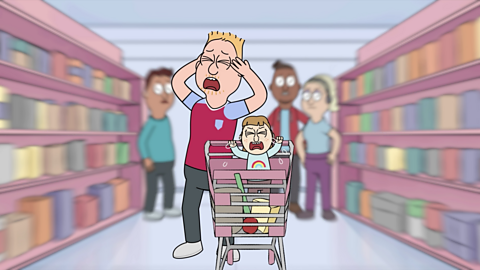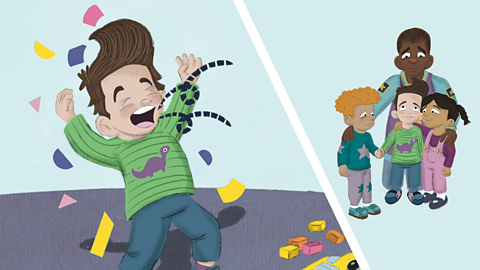Red faces, toys launched across rooms, outright refusal - toddler parents will be familiar with the behaviour that stems from their children's anger. Adults have a very similar way of looking at frustrating situations. When we get angry, we might feel a meltdown bubbling under the surface too!
Anger involves two parts of the brain: the amygdala, and the hypothalamus. The amygdala detects emotions, and the hypothalamus manages your heart rate and body temperature.
As adults, we're able to use our fully-functioning brain to help with impulse control. With children, these areas of the brain are still developing, so experiencing anger can more often lead to outbursts.

As parents and carers, we can help children develop coping strategies, articulate their feelings and be able to deal with strong emotions or disappointments.
We spoke to mental health specialist Raoul Lindsay, about setting boundaries, preventing outbursts in the first place and the dos and donвАЩts of dealing with them.
How can you avoid tantrums and set boundaries?
When we donвАЩt have our basic human needs met, itвАЩs very hard to be reasonable (at any age!). Naturally, being tired, hungry, or uncomfortable can lead to a meltdown in your little one.
Manage expectations for your toddler
Daily routines and time pressures, such as brushing teeth or needing to get to work on time can be hard for a toddler to understand. Without the right understanding of the significance of phrases like вАШyouвАЩre making me lateвАЩ, they might continue to feel frustrated.
When it comes to routines, communicating with your child so they always know what to expect can help.

Raoul says that narrating routines can be beneficial for your child, so that they know what to expect daily:
Language like вАШI expect you to be able to put your clothes onвАЩ or вАШI will help you with your clothes in the morning before workвАЩ helps them to understand that this is part of the routine.
Communicating your thoughts beforehand, that youвАЩd expect them to hold your hand while crossing the street, perhaps, can both set the scene and prevent a meltdown in the first place. If they know that theyвАЩre going to the shops to get things for dinner and not going to get any sweets, it sets the foundations of what they can expect.


Promote independence
Explain that they're in charge of certain things, like getting dressed, to nurture that feeling of independence, Raoul suggests.
They might be able to see the importance of what's happening and why rules and boundaries are in place if you help them to think about other places where there are rules, like at nursery or with babysitters.
It can also be helpful to make other adults aware of any rules you've set together, which helps maintain the consistency needed for your child to understand them.


What should you do when there is an outburst?
Communicate to them that you know how they feel
Tantrums are highly unlikely to be manipulative. They are often an expression of an emotion that they don't yet have the understanding of or words to effectively communicate.
Raoul says you can show your child that you're listening by repeating their words back to them.
If they really want chocolate, you can say, вАШI understand that you really want the chocolate, but at the same time, this is not going to happen right nowвАЩ and explain to them why

Redirecting
If youвАЩre shopping with your child and they demand ice-cream, even though you've explained beforehand that they canвАЩt have it, you can try to draw their attention to something else, e.g. вАШLook at that dog!вАЩ, or вАШlook at how many colours we can see on the on the top shelf!вАЩ
Raoul explains that once they've had a moment to calm down, they may be able to move on.

Removing items
An example could be a child using a tablet and refusing to turn it off when itвАЩs time to eat.
You could say, вАШI'm going to remove this tablet because it's dinner time, after dinner, you can have it backвАЩ or вАШbecause you haven't listened and given it to me when it's time to eat, you'll lose five minutes off your device timeвАЩ.
Explain why listening is important and why dinner time together is important and not just because you told them to do something.
Raoul advises that it can even be helpful to remind them of when it happened last time.
вАШDo you remember when you were angry last time? A tantrum happened and you lost 5 minutes off your device last time? ItвАЩs going to happen again, and this is whyвАЩ.
Talk them through why theyвАЩre experiencing consequences, it shouldnвАЩt be a situation where they donвАЩt understand why it's happening.

Give yourself a time-out!
Any instructions to an angry or upset child are best delivered in a calm, considered way. When you're meeting your child on their frustration level, whatever the message is, it is unlikely to land quite as well.
Raoul says, if you feel like youвАЩre too angry to deal with a situation in the moment, you might say, вАШI'm going step away into the kitchen, I can still see you. I can still hear you.вАЩ
You can offer them a cuddle and be reassuring and just tell them that youвАЩll talk about it in a couple of minutes.

What should you avoid?
DonвАЩt have too high expectations of their understanding
The stage your child is at in their brain development combined with their emotional literacy means being able to express exactly how they're feeling is a big task for a toddler.
Raoul says that you should remember to try not to expect your child to behave like an adult.
You canвАЩt force your child to say sorry when they donвАЩt quite understand what that means or why theyвАЩre saying it.

Try not to compare your child to others
Every child is different.
Sometimes when we say, вАШyour brother or sister didn't do thisвАЩ, or вАШwhy can't you be like your cousin?вАЩ, it stops them seeing that you understand them as an individual.

DonвАЩt take it personally
It can be draining, being a parent, working, looking after a home and looking after ourselves. You're juggling a lot. Sometimes we expect perfection of ourselves.
A child having a tantrum in public can feel embarrassing. And you may feel guilty when you have family members or friends' children that seemingly don't have any tantrums at all.
Emotional outbursts are often part of a natural phase as children to try to understand and work out what's happening in their lives; they don't make you a bad parent.

Support
As a parent or carer, you might need support from professionals who can offer guidance on how to work with your child's emotions and how they express them. Your own intuition and what you what you feel is important - remember, there isn't an expectation that parents need to have all the answers and know everything!
If you think your child might be neurodivergent, you can always speak to a health visitor or GP. Schools and nurseries may also be able to help pick up on early signs.






